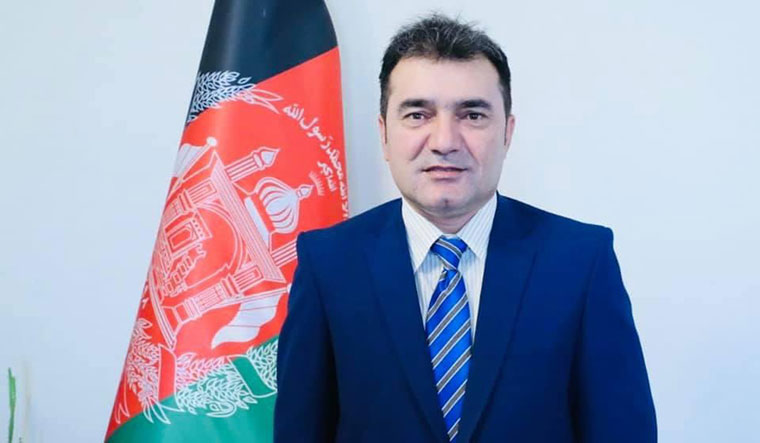The Taliban ambushed and killed the director of Afghanistan's government media center on Friday in the capital of Kabul, the latest killing of a government official just days after an assassination attempt on the country's acting defense minister.
The slaying comes amid Taliban advances and battles for more territory as U.S. and NATO forces complete their final pullout from Afghanistan by the end of the month.
The Taliban have been waging fierce battles for months across Afghanistan, laying siege to provincial capitals in the south and west of the country after capturing district after district and even seizing several key border crossings.
On Friday, in southern Nimroz province, the capital of Zaranj was on the brink of falling to the Taliban, with fierce fighting inside the city and around key infrastructure, said provincial council chief Baz Mohammad Nasir.
Taliban spokesman Zabihullah Mujahid told The Associated Press that the insurgents killed Dawa Khan Menapal, the chief of the Afghan government's press operations for local and foreign media. He had previously been a deputy spokesman for Afghan President Ashraf Ghani.
The assassination took place during weekly Friday prayers, according to the Interior Ministry's deputy spokesman, Said Hamid Rushan. After the shooting, Afghan forces fanned out across the neighborhood of Kabul where Menapal was gunned down while riding in his car.
Mujahid, the Taliban spokesman, later put out a statement claiming responsibility and said that Menapal was killed in a special attack by the mujahedeen, or holy warriors.
The Taliban often target government officials and those they perceive as working for the government or foreign forces, though several recent attacks have been claimed by the Islamic State group. The government most often holds the Taliban responsible.
Earlier this week, a Taliban bombing attack targeted Afghanistan's acting defense minister, Bismillah Khan Mohammadi. The attack in a heavily guarded upscale Kabul neighborhood late Tuesday killed at least eight people and wounded 20. The minister was unharmed.
The bombing was followed by a gunbattle that also killed four Taliban fighters. The militants said the attack was to avenge Taliban fighters killed during government offensives in rural provinces.
Meanwhile, Afghan and U.S. aircraft pounded Taliban positions in southern Afghanistan's Helmand province on Friday, as the insurgents closed a major border crossing with neighboring Pakistan.
Residents in Helmand's contested provincial capital, Lashkar Gah, said airstrikes destroyed a market in the center of the city an area controlled by the Taliban. Afghan officials say the Taliban now control nine out of the 10 districts of the city.
Afghanistan's elite commandos have deployed to Lashkar Gah, backed up by airstrikes by the Afghan and U.S. air forces.
The Taliban began sweeping across Afghanistan at an unexpected speed after the U.S. and NATO began their final pullout in late April. More than half of Afghanistan's 421 districts and district centers are now in Taliban hands. While many of the districts are in remote regions, some are deeply strategic, giving the Taliban control of lucrative border crossings with Iran, Tajikistan and Pakistan.
In southeastern Afghanistan, the Taliban last month took control of the town of Spin Boldak on the border with Pakistan, one of Afghanistan's busiest border crossings. Thousands of Afghans and Pakistanis cross daily and a steady stream of trucks pass through, bringing goods to land-locked Afghanistan from Pakistan's Arabian Sea port city of Karachi.
On Friday, the Taliban shuttered the crossing over a visa dispute, claiming Pakistan was abiding by Kabul government requirements for Afghans traveling into Pakistan to have a passport and a Pakistan visa. Previously, travel documents were rarely demanded and Afghans with local ID card could cross into Pakistan.
The border will stay closed until Pakistan allows all Afghans to cross on the bases of our old procedure, said the Taliban statement.
Islamabad's relationship with Kabul has been deeply troubled with both sides accusing each other of harboring militants. Afghan Taliban leaders live in Pakistan and Kabul is bitterly critical of Pakistan for aiding them and treating their fighters in hospitals in Pakistan.
Islamabad meanwhile charges that Kabul provides a safe haven to Pakistani Taliban, a separate militant group that regularly stages attacks in Pakistan.





